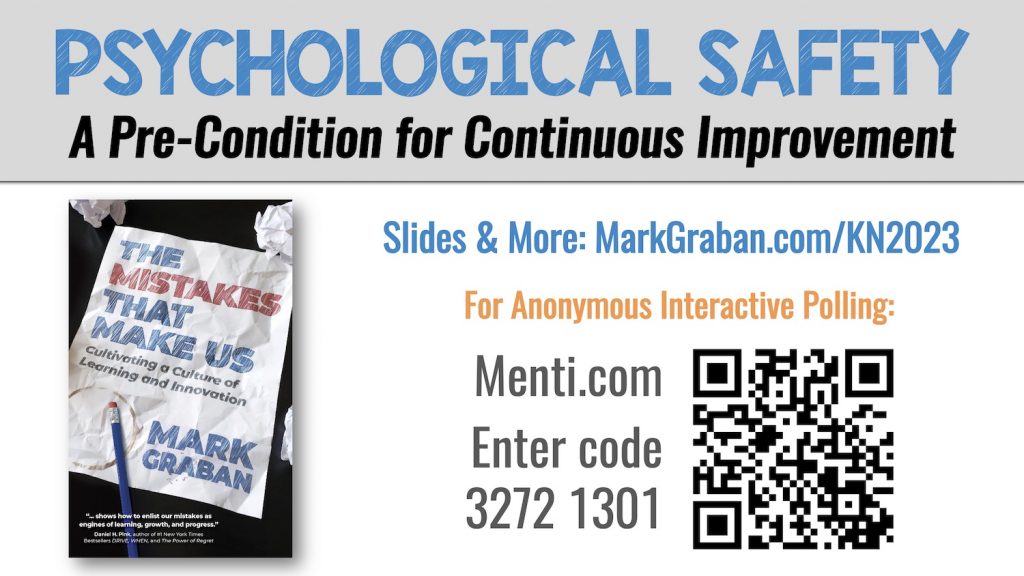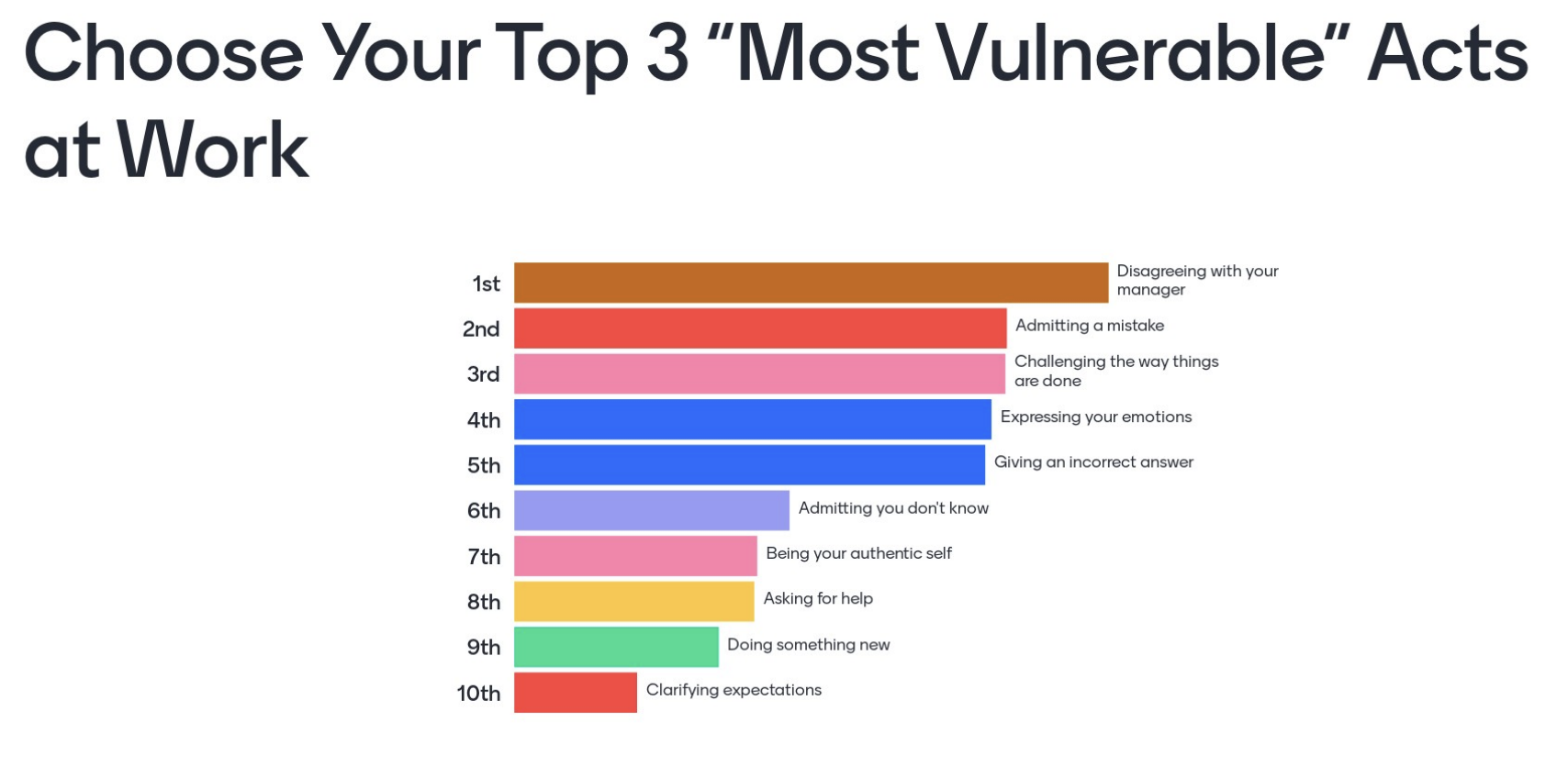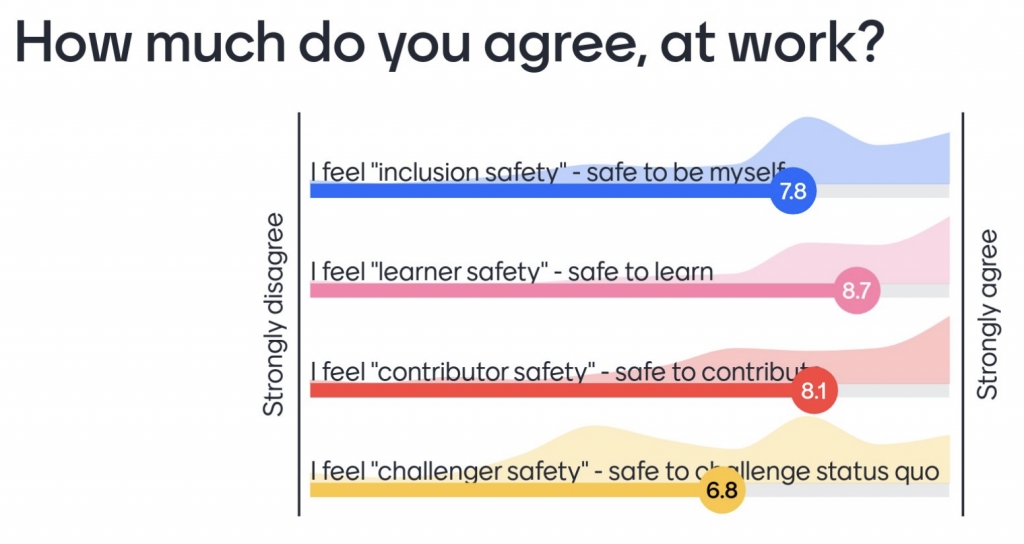Mark's page about Psychological Safety
Download a summary of a pre-KaiNexicon survey about Psychological Safety (PDF) — Read this in a blog post format.
Download Slides (PDF)

Polling Results:
Thanks for participating in the interactive polling!


Examples of Vulnerable Acts:
| Taking risks |
| Sharing a personal insecurity |
| Saying, “I made a mistake” |
| Admitting you don't know the answer |
| Holding yourself, as a leader, accountable for mistakes, publicly |
| Share my feelings (feelings are different from opinions) about things/situations |
| Transparency of expressing inner truth risking image perception. |
| Doing something out of your comfort zone, an act that feels a risk to you and your reputation. |
| Something we sat or do that puts us at exposure to risk or loss |
| Admitting you need help |
| Giving feed back |
| Admitting that you’ve made a mistake. |
| Asking for help |
| Identifying a problem |
| Sharing a different opinion than your leader |
| Admitting you don’t know the answer to a question |
| Pointing out a mistake |
| Disagreeing with a supervisor |
| Saying I’m sorry |
| I don’t know |
| Sharing something personal |
| Admitting failure in an initiative. |
| Reporting misconduct |
| Admitting that “I don’t know” |
| Saying that you do not understand something |
| Leading training |
| A fear |
| Giving an opinion to leadership |
| Asking for help |
| Confessing a mistake |
| Raising your hand |
| To ask for a raise |
| Admitting a mistake |
| Asking a question. |
| Asking someone for help on a task |
| Admiring mistake |
| Challenging a General Manager on project priority |
| Going for a walk in unfamiliar places |
| Leading a training class for the first time |
| Disagreeing with others |
| Asking a question |
| Sharing a hard experience. |
| Speaking out against the favorable answer. |
| Disagreeing with your boss |
| Admitting that you don't know everything |
| Standing up to someone |
| Asking for help. |
| Raising a red flag |
| Disagreement |
| Suggesting an alternative to a leading idea. |
| Saying “I don’t know” |
| Telling a joke |
| Sharing an unpopular opinion or your feelings |
| Reporting theft |
| Speaking up about something that bothers you |
| Sharing an unfavorable opinion. |
| Sharing problems with new process. |
| Appearing uncertain |
| Admitting you are not the expert |
| To confront the person who is harassing you |
| Sharing a story |
| Business meetings with executives |
| Pointing out someone else's mistake |
| Poor decision making |
| Being open and honest with full accountability. |
| Admitting a mistake |
| Taking a challenge |
| Saying I don’t know |
| Pointing out a mistake |
| Saying I made a mistake. |
| Sharing something personal |
| Asking a question that may be considered “dumb” |
| Not following the standard |
| Making a recommendation that could put someone else in the company in a negative spot |
| Asking a question |
| Identifying a process that could cause harm |
| Telling your boss he’s wrong |
| Describeing the impacts of COVID personally. |
| Admitting you are wrong |
| Admitting culpability |
| Admit a step was missed in process |
| Expressing thoughts/feelings |
| Presenting on stage |
| Lead people inspire of low subject matter expertise. |
| Sharing historical story of failure |
| Getting out of comfort zone at work for professional growth |
| Admitting you are wrong |
| Describing the impact of COVID personally |
| Crucial conversations with leaders higher in the organization |
| Crying out of frustration in a meeting |
| Participating during a presentation |
| Setting boundaries |
| Disagree with manager |
Other Resources:
- The Mistakes That Make Us: Cultivating a Culture of Learning and Innovation – book by Mark Graban
- Mark's interview with Amy Edmondson on the Lean Blog Interviews Podcast
- The 4 Stages of Psychological Safety – book by Timothy R. Clark
- The Fearless Organization – book by Amy Edmondson
- About Google's Project Aristotle
